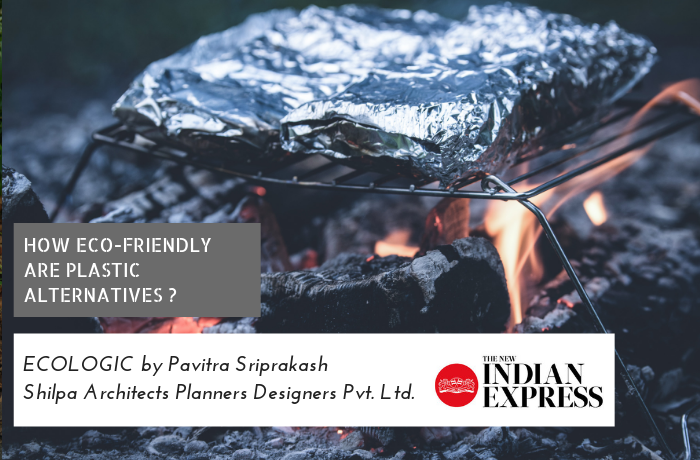05-Jan-2019: Pavitra Sriprakash, Director and Chief Designer at Shilpa Architects Planners Designers writes a weekly column on Sustainability for The New Indian Express titled “ECOLOGIC”. This week she writes about “Are the alternatives to plastic really eco-friendly? ”
Full article below: (Also available at The New Indian Express Website)
The ban is ON! Since the beginning of this year, the ban on single- use plastic items is in effect in Tamil Nadu. As we settle in on the reality of this new normal, it is time for us to make new habits in place of old ones. It may seem simple — there are fourteen items on the list that have been banned — granted these are bad for the environment and should have been long gone. Also, it is granted that we are ill-prepared for the new types of demand that will come into play now as the alternative products may or may not be readily or inexpensively available in the market.
We also need to understand how bad some of these proposed ‘alternatives’ are. For example, I am sad to see aluminium foil on the list of ‘alternatives for banned plastic’ as this is one material which could be as hard to eliminate or biodegrade as plastic.
This prompts the question — what kind of recycling will we need for these ‘alternatives’? Do they already exist in our cities across the state? The truth is that as of today none of the local recyclers readily accept aluminium. Let us take the instances where we are likely to replace plastic with aluminium — for fast food packaging, in canned goods (instead of the PET bottles), and maybe in milk packets by going in for tetra packs. Foil can be recycled similar to a can, but since it’s most often contaminated with food waste or combined with plastic, there’s no guarantee you can recycle it with your cans. Making foil, used for food packaging, ‘recycle-worthy’ is quite laborious.
It needs to be washed and cleaned. While burns and holes won’t affect its recycle value, any sauces or food leftovers in it will make it ‘trash-worthy’. If foil is combined with other materials (such as in biscuit covers, chips’ wrappers and yogurt tops) and can’t be separated, it cannot be recycled and will have to be thrown away to a landfill. Foil mixed with other materials is considered recycling contamination. It is a good idea to combine all sheets of foil into one ball to keep it easily separated from other products, and also prevent it from blowing away (it is a very light material) if you do plan to recycle it and have prepared it accordingly.
When it comes to cans, it is a different story. Even in countries where cans have been around for a long time, only about 50% of the cans actually get recycled. But, since the ban in TN does not include PET bottles, the requirement for behaviour change to switch to cans will not be there. So, the demand for canned goods skyrocketing in our state is quite unlikely. Tetrapacks remain the hardest of all to recycle globally.



